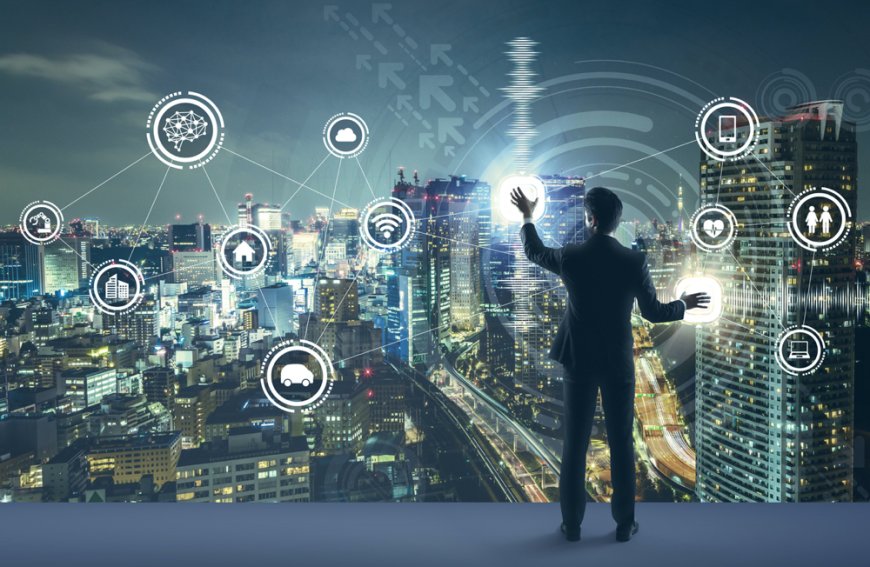Cities and Infrastructure use of AI Technology

Cities and Infrastructure use of AI Technology:
Cities and infrastructure use of AI technology refers to the integration of artificial intelligence (AI) into the design, management, and operation of urban infrastructure such as transportation, buildings, energy systems, water management, and waste management. AI technology can help cities and infrastructure become more efficient, sustainable, and resilient.
Some examples of cities and infrastructure use of AI technology are:
1. Smart Transportation: AI can be used to optimize traffic management and reduce congestion, by analyzing real-time traffic data, predicting traffic flow, and providing alternative routes for drivers.
2. Smart Buildings: AI-powered building management systems can optimize energy consumption by adjusting temperature, lighting, and other parameters based on occupancy patterns and weather data.
3. Smart Energy Systems: AI can help to integrate renewable energy sources into the grid, by predicting energy demand and managing the supply from different sources.
4. Smart Water Management: AI can be used to monitor water quality, detect leaks, and optimize water distribution, by analyzing data from sensors and other sources.
5. Smart Waste Management: AI-powered waste management systems can optimize waste collection routes, reduce landfill waste, and improve recycling rates by analyzing data on waste generation and composition.
The benefits of cities and infrastructure use of AI technology are numerous. For example, it can reduce energy consumption, lower costs, improve safety, and enhance the quality of life for citizens. AI technology can also enable cities to become more resilient to natural disasters and other challenges.
However, there are also challenges and risks associated with the use of AI in cities and infrastructure. For example, there are concerns about data privacy, cybersecurity, and bias in AI algorithms. It's important to address these issues and ensure that AI technology is used in a responsible and ethical manner.
In conclusion, cities and infrastructure use of AI technology has the potential to transform the way we live, work, and interact with our environment. By leveraging the power of AI, we can create more sustainable, efficient, and livable cities that benefit everyone.
Types of Cities & Infrastructure use in AI Technology:
There are various types of cities and infrastructure use in AI technology, some of which are:
1. Smart Cities: These are cities that utilize AI and other advanced technologies to improve the quality of life for citizens, reduce resource consumption, and enhance sustainability.
2. Intelligent Transportation Systems: These systems use AI technology to optimize traffic flows, reduce congestion, and enhance road safety.
3. Building Automation: This involves the use of AI to automate building systems such as lighting, heating, ventilation, and air conditioning, to optimize energy consumption and reduce costs.
4. Energy Management: AI can be used to manage energy consumption and optimize power grids, thereby reducing waste and enhancing sustainability.
5. Public Safety: AI can be used to enhance public safety by improving emergency response times, analyzing crime data, and identifying potential threats.
6. Waste Management: AI can be used to optimize waste management processes by identifying the most efficient routes for waste collection and improving recycling rates.
7. Water Management: AI can be used to optimize water consumption, improve water quality, and reduce waste.
8. Health Care: AI can be used to improve health care services, including disease detection, diagnosis, and treatment, and to enhance patient outcomes.
9. Environmental Monitoring: AI can be used to monitor and analyze environmental data, including air quality, water quality, and weather patterns, to support environmental conservation efforts.
These are just a few examples of the types of cities and infrastructure use in AI technology, and new applications are continually being developed as technology advances.
Who is Discovered Cities & Infrastructure use in AI Technology:
As I mentioned earlier, there is no one person or entity that can be credited with discovering cities and infrastructure use in AI technology. However, here are some of the companies and organizations that are currently involved in developing and implementing AI solutions for cities and infrastructure:
1. IBM: IBM has developed an AI-powered system called "Watson IoT" that can help cities and infrastructure become more efficient and responsive by providing real-time insights into things like traffic flow, energy usage, and water management.
2. Cisco: Cisco has developed an AI-powered platform called "Kinetic for Cities" that can help cities and infrastructure manage data from various sources, such as traffic cameras, environmental sensors, and social media feeds, to make better decisions about things like transportation, public safety, and city planning.
3. Siemens: Siemens has developed an AI-powered system called "City Brain" that can help cities and infrastructure manage and optimize their resources, such as energy, water, and transportation, by analyzing data from various sources and making real-time decisions based on that data.
4. Microsoft: Microsoft has developed an AI-powered platform called "Azure IoT" that can help cities and infrastructure monitor and manage their assets, such as buildings, roads, and bridges, by collecting and analyzing data from various sources, such as sensors and cameras.
5. Alphabet: Alphabet, the parent company of Google, has developed an AI-powered system called "Sidewalk Labs" that can help cities and infrastructure design and build more efficient and sustainable neighborhoods by analyzing data on things like energy usage, transportation patterns, and public space usage.
These are just a few examples of the companies and organizations that are currently involved in developing and implementing AI solutions for cities and infrastructure.
Working Process of Cities & Infrastructure use in AI Technology:
The working process of AI technology in cities and infrastructure involves the use of various sensors and data sources to collect information from the environment. The data is then processed using machine learning algorithms to generate insights and make decisions.
For example, in a smart city, sensors can be used to monitor traffic flow, air quality, and water usage. The data collected can then be analyzed using AI to optimize traffic patterns, reduce pollution, and conserve water.
In the case of infrastructure, AI can be used to monitor the performance of equipment and predict maintenance needs. Sensors can be placed on bridges, buildings, and other infrastructure to collect data on vibration, strain, and other indicators of wear and tear. This data can then be analyzed using machine learning algorithms to identify potential problems before they become major issues.
AI can also be used to optimize the design of buildings and infrastructure. Computer-aided design (CAD) software can be used to generate 3D models of structures, and machine learning algorithms can analyze the data to identify the most efficient designs.
Overall, the working process of AI in cities and infrastructure involves collecting data, analyzing it using machine learning algorithms, and using the insights generated to optimize operations and improve performance.
All Over Company Details & Information of Cities & Infrastructure use in AI Technology:
There are many companies that are involved in the development and deployment of AI technology in cities and infrastructure. Some of the key players in this field include:
1. IBM: IBM's Watson IoT platform is used in smart cities to collect and analyze data from a range of sources, including sensors, cameras, and social media.
2. Cisco: Cisco provides a range of networking and infrastructure solutions for smart cities, including sensors, security cameras, and network switches.
3. Siemens: Siemens offers a range of solutions for smart cities, including energy management systems, traffic management systems, and building automation systems.
4. Intel: Intel provides a range of AI-powered solutions for smart cities, including edge computing platforms, IoT sensors, and machine learning algorithms.
5. Microsoft: Microsoft's Azure cloud platform is used in smart city deployments to collect and analyze data from a range of sources, including sensors, social media, and other data feeds.
6. Google: Google's parent company Alphabet has a subsidiary called Sidewalk Labs, which is focused on developing smart city solutions using AI and other technologies.
7. Huawei: Huawei provides a range of networking and infrastructure solutions for smart cities, including IoT sensors, smart lighting systems, and security cameras.
These are just a few examples of the companies that are involved in the development and deployment of AI technology in cities and infrastructure. As the field continues to evolve, we can expect to see more companies entering the market and developing innovative solutions to address the challenges of urbanization and infrastructure development.
How We Can Learn Cities & Infrastructure use in AI Technology:
There are various ways to learn about the use of AI technology in cities and infrastructure. Here are a few suggestions:
1. Online courses: There are several online courses available on platforms such as Coursera, edX, and Udemy that provide comprehensive knowledge on the use of AI technology in cities and infrastructure. These courses are usually taught by industry experts and cover topics such as smart cities, urban planning, and infrastructure management.
2. Books: There are several books available that provide a detailed understanding of the use of AI technology in cities and infrastructure. Some popular titles include "Smart Cities: Big Data, Civic Hackers, and the Quest for a New Utopia" by Anthony M. Townsend and "The Future of Transportation and Communication: Visions and Perspectives from Europe, Japan, and the U.S.A." by Tatsuo Itoh and Gerhard P. Fettweis.
3. Industry events and conferences: Attending industry events and conferences related to AI technology in cities and infrastructure is another great way to learn. These events bring together experts and professionals from the industry who share their insights and experiences on the use of AI technology in cities and infrastructure.
4. Online resources: There are several online resources available such as blogs, podcasts, and webinars that provide valuable insights on the use of AI technology in cities and infrastructure. These resources are often free and easily accessible, making it convenient for students to learn and stay updated on the latest developments in the field.
5. Internships and research opportunities: Students can also gain practical experience by pursuing internships and research opportunities with companies or organizations working on AI technology in cities and infrastructure. This provides an opportunity to work on real-world projects and gain hands-on experience in the field.
Cities & Infrastructure use in AI Technology is Helpful for Student:
Yes, learning about the use of AI technology in cities and infrastructure can be helpful for students. It can provide a deeper understanding of how technology can be used to make urban areas more efficient, sustainable, and livable. It can also prepare students for careers in urban planning, civil engineering, or other related fields where knowledge of AI technology and its application in cities is becoming increasingly important. Additionally, studying the use of AI in cities can foster critical thinking and problem-solving skills as students explore the potential benefits and drawbacks of using technology in urban areas.
Some Social Official Links of Cities & Infrastructure use in AI Technology:
Official Website:
https://www.ibm.com/industries/government/infrastructure-citizen-services
https://www.cisco.com/c/en/us/solutions/artificial-intelligence.html
https://www.siemens.com/global/en.html
https://www.intel.in/content/www/in/en/internet-of-things/smart-cities.html
https://www.microsoft.com/en-us/industry/government/resources/smart-cities
https://cloud.google.com/solutions/ai
Facebook: https://www.facebook.com/cityai/
Instagram: https://www.instagram.com/welcome.ai/?hl=en
Twitter: https://twitter.com/CityDataAI
What's Your Reaction?























































